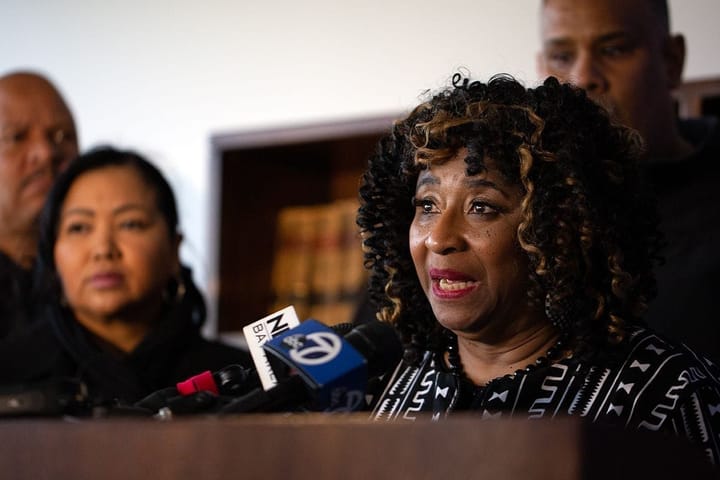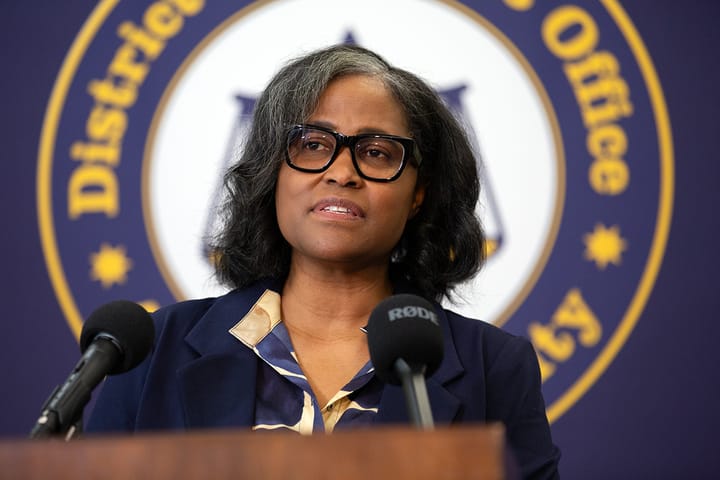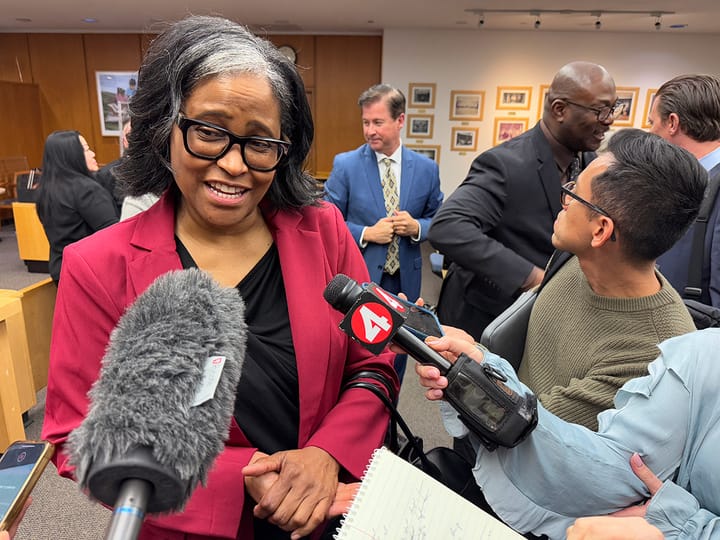UPDATE: Phong Tran held to answer in perjury, bribery case
Judge Clifford Blakely said the evidence presented was enough to support all five felony counts against Phong Tran for the purpose of a prelim.

Update, 11:15 a.m. Oakland Police Detective Phong Tran was held to answer Wednesday morning on perjury charges and allegations of witness tampering in relation to a murder case from 2011. The Alameda County DA's office said Tran could face a maximum of six years and eight months in prison if he is ultimately convicted.
Original story: An Alameda County judge is slated to rule this week about whether Oakland Police Detective Phong Tran may have lied on the stand and pressured witnesses to give false testimony about a 2011 murder case that sent two men to prison.
Both men were later freed, their sentences vacated, after a key witness recanted and said she had not been a witness to the murder at all.
Alameda County District Attorney Pamela Price charged Tran in April with committing perjury twice in relation to the murder case. Price also alleged that Tran bribed the key witness and tried to bribe another woman in his efforts to suborn perjury, according to court papers.
Tran's attorney, Andrew Ganz of Rains Lucia Stern St. Phalle & Silver, has said there is "no basis" for the charges and that Tran is "eagerly seeking to clear his name."
Don't miss the daily headlines.
Tran's preliminary hearing is slated to end Wednesday, with closing arguments by Ganz and prosecutor Zachary Linowitz set to take place in the morning before Judge Clifford Blakely.
The hearing is akin to a mini-trial where Linowitz must prove that the alleged crimes may have occurred and that Detective Tran could have committed them.
It's a much lower standard of proof than at trial, however, where a conviction requires proof beyond a reasonable doubt.
If Judge Blakely holds Tran to answer on the charges against him, the case would next proceed to trial.
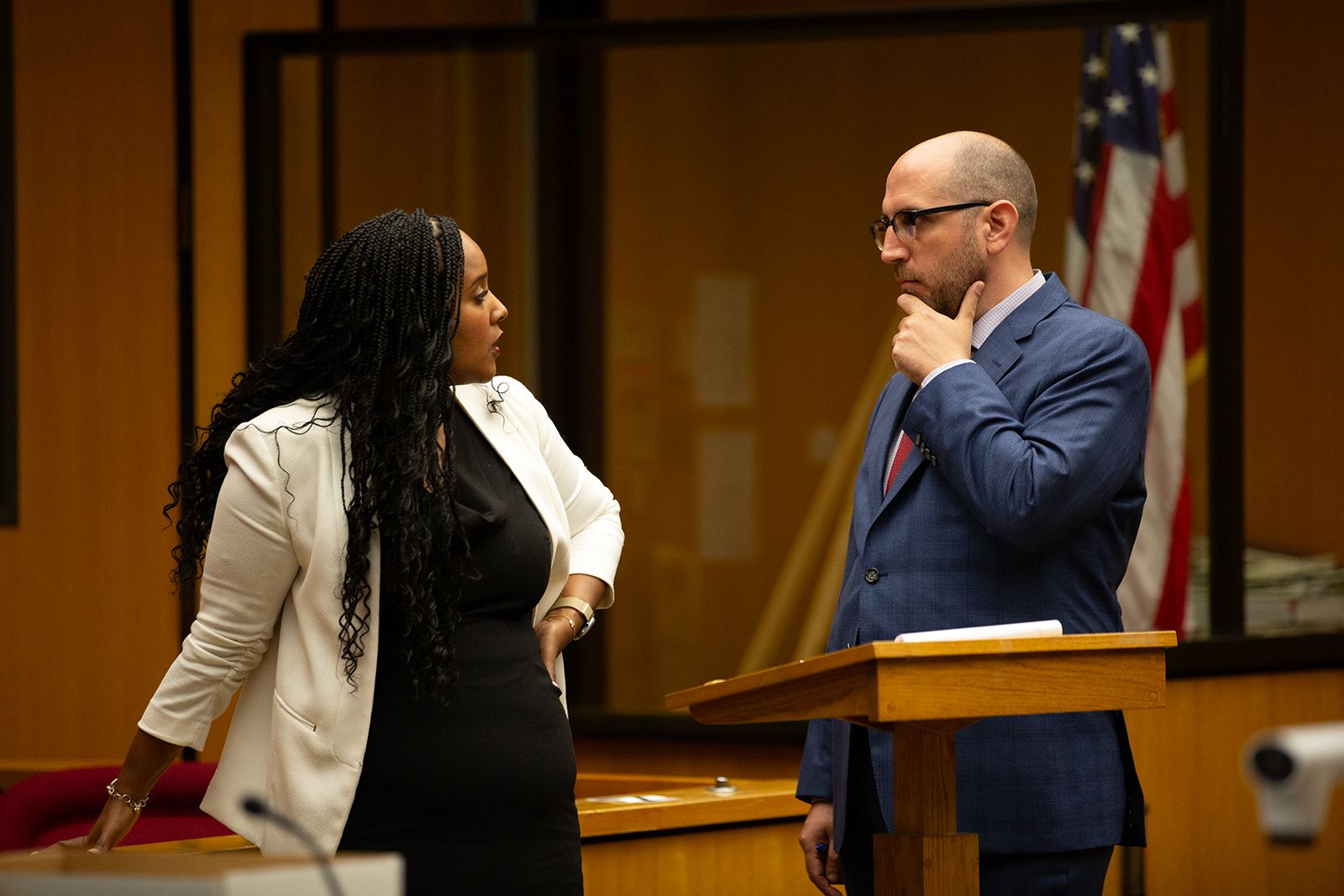
The hearing, often called a prelim or a px, began Friday morning.
Over the course of two full days, seven people have testified: two civilian witnesses related to the 2011 murder case, two defense attorneys, two DA investigators and an OPD homicide detective.
(Court was closed Monday for the Juneteenth holiday.)
Deputy District Attorney Linowitz, a former public defender who was hired by DA Pamela Price in part to tackle police misconduct cases, also presented evidence this week regarding two people — from other murder cases — who say Tran paid them "to claim that they were witnesses in a way that they were actually not."
Tran has not been charged in connection with those accounts, but Linowitz presented the information in an effort to establish a pattern of alleged conduct.
"I’ll be like a little ATM for you," Tran told one of those witnesses, according to evidence presented Tuesday.
Over the course of the hearing, witnesses also spoke about the challenges of securing eyewitness testimony in Oakland, where threats of violence and retribution are commonplace for those who cooperate with police, particularly when it comes to murder cases.
To that end, Ganz described a number of the witnesses in the prosecution's case as "people who are recanting because they’re scared."
An evolving story
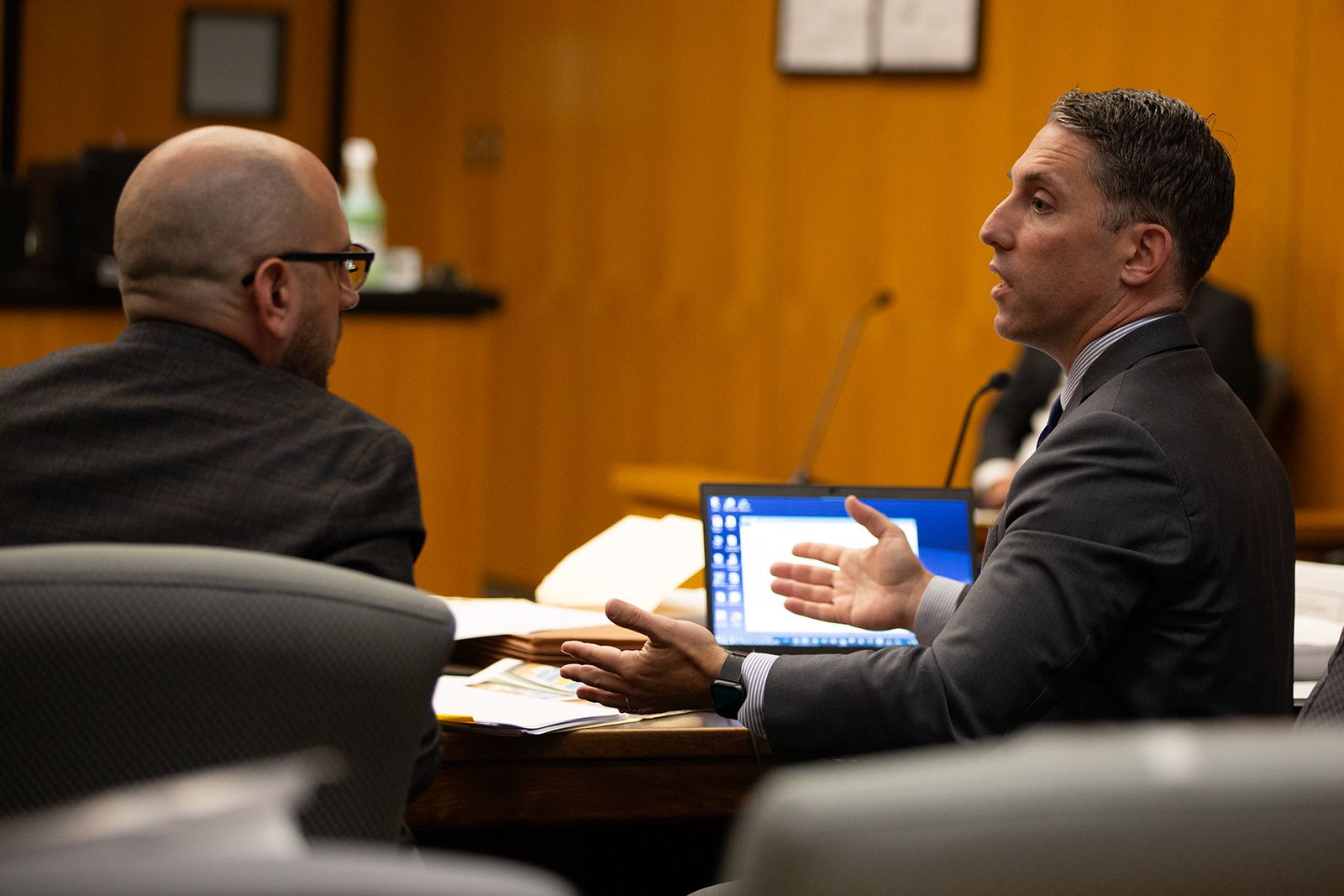
The case against Tran rests in large part on the credibility of Aisha Weber, an admitted liar who was granted a form of immunity to testify Friday. (The prosecution agreed not to use any of Weber's statements against her.)
Weber has given a number of inconsistent statements since she became part of the murder case in 2013.
After giving an initial recorded statement, Weber testified during the preliminary hearing in 2014 and at trial in 2016, resulting in murder convictions for Giovante Douglas and Cartier Hunter.
Then, in 2020, Weber told a defense attorney who was representing Douglas that she'd lied about what she'd seen.
Her story became more elaborate when she relayed her allegations to the DA's office in April.
And, on Friday on the stand, she shared new details she said she had not previously disclosed.
But there were also many key facts she said she could not remember, including approximately how many times Detective Phong Tran allegedly paid her or even a ballpark amount of how much he gave her, particularly before she testified.
"I don’t remember specific times," she said Friday, frowning and shaking her head, after being asked about her "best recollection" and other examples of receiving money from Tran.
"I don't remember," she said repeatedly in relation to questions about the alleged payments.
Weber did say Tran gave her $5,000 in a white envelope, in a room with other male officers at OPD, after she testified at trial.
The bulk of the money Weber got — the figure $30,000 has come up in court papers and the prelim — appears to have come through a witness protection program, which the defense knew about during the murder case, to help with relocation fees and other expenses.
But, in a declaration last year, Tran also said he "periodically" gave Weber "money if she requested it." He estimated the sum at $1,500 to $2,000 total, "with the majority being provided after the trial."
Tran did arrange for Weber to get a $1,000 Crime Stoppers reward about a year after the trial, he wrote in the declaration, and once loaned Weber several hundred dollars when her car was towed.
She was not an informant, Tran wrote last year, and Weber "was not provided financial assistance or other consideration" before she gave her initial statement in the murder case.
Where it all began
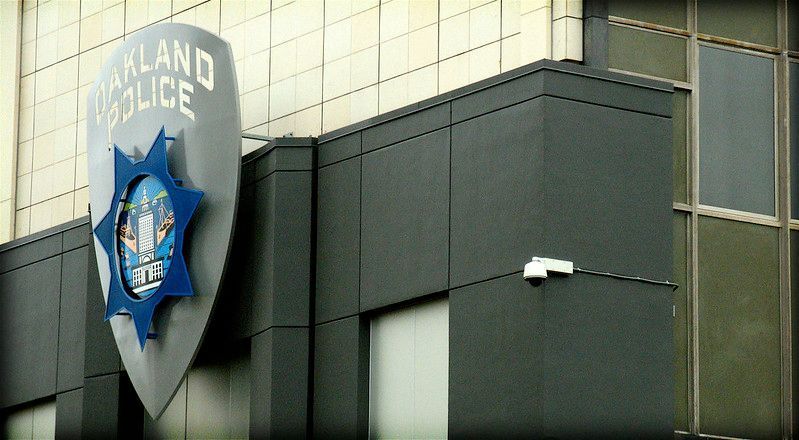
On Sept. 12, 2013, Weber went into the Oakland Police Department and provided a detailed statement about the fatal shooting of Charles Butler Jr., which had taken place nearly two years earlier at 46th and West streets in North Oakland.
Ganz played the video of that recorded statement, which Weber made to Tran and a colleague, to close his case on Tuesday afternoon.
In the video, Weber describes walking up West Street after dropping off her kids, then ages 5 and 7, on the morning of Dec. 22, 2011.
She said she saw a car stopped at 46th Street, so she paused on the southwest corner and watched the driver inch forward to get a better look at oncoming traffic. She wasn't sure if it was safe to cross.
Then a Lexus — she described seeing the emblem on the car — pulled up just behind the driver and stopped with the passenger door "probably, like, 5 inches away from the tail light of the car," she told Tran.
The passenger, whom she identified as "Corn," jumped out wearing a black hat, a black hoodie and blue jeans. A man she knew as "Gio" was behind the wheel, she said in the recorded statement.
"Corn" opened fire, Weber told the detectives, describing the pattern of gunfire and the number of shots she heard. Butler hadn't shot back.
"I really don’t even think he knew what was comin'," she told the detectives. "The way they pulled up on his car, that boy didn’t have a chance."
Butler's car then "went cattycorner clear across the street," striking a car on the other side of the intersection and catching fire, she said in 2013.
Then Corn got back into the Lexus and Gio sped off, she said, screeching off up the street.
"It was loud," she said, "like burnin' rubber."
Weber told the detectives she hadn't seen a gun during the shooting. But she remembered how she "stepped back" when she heard the burst of gunfire.
"The first ones, they take you by surprise," she said. "You was like, whoa."
She said a white man came out of his house and pulled the wounded man out of the burning car. There was "hella smoke all over."
A neighbor came out of her house to see what happened and another woman, an "older lady," was sitting in a parked vehicle that was involved in some way in the collision.
"I was kinda spooked," Weber told the detectives. "It was a lotta people out."
She said she left after a fire truck and ambulance arrived.
"I didn’t say nothin'. I don’t know, just being from that area," she told Tran. "You know how it is."
During the recorded interview, Tran described how Weber had called him at the office to say she knew "exactly who did it" and that she "saw everything."
He asked her to explain why she had come forward when she did.
She said she came in after the Butler family made a plea for tips on the news.
But she said she was still afraid, for herself and for her kids, and asked to be seated in the corner so that only her voice, not her face, was on camera.
Tran agreed to call her "A" during the interview due to her concerns about her safety.
After that, Tran and his colleague left the room and an officer came in to show Weber two photo lineups. She picked out the photograph of Cartier Hunter, whom she identified as the shooter, and the one of Giovante Douglas, whom she said was the driver.
After the murder trial, serious threats
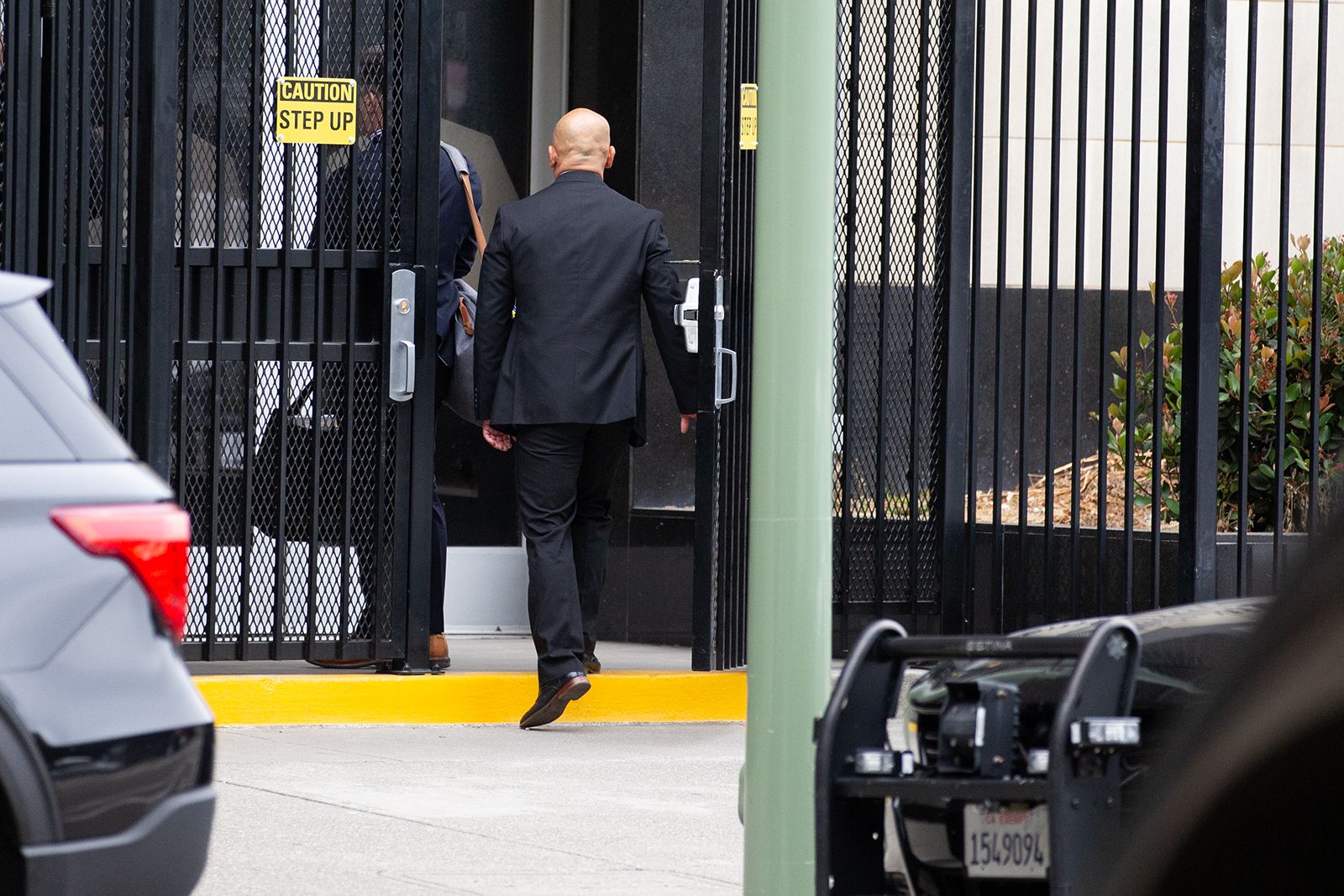
In July 2018, about two years after the murder trial, Weber left the Bay Area.
That same month, she texted Tran in all capital letters, saying, "OMG I'm telling you what's going on. They are trying to kill me and my kids."
She testified Friday that she "left for personal reasons that had nothing to do with the case or my involvement in the case."
But she also testified that, "Yes, I did receive threats. But I removed myself from that situation."
She said the threats, which scared her, were due to the murder case. She gave Tran the address of the person she believed was responsible.
In February 2019, Weber and her family were still being threatened, according to texts read in court.
"It’s a really big problem with that case. And it’s seriously serious. I might have to call and talk to that DA," she wrote to Tran. "Not only is my safety a concern but my children as well."
The next year, in August 2020, Weber connected with Matthew Dalton, a defense attorney who was representing Douglas at the time.
Exactly how that happened was disputed in court: Weber said Dalton got in touch with her, while Dalton said Weber called him after a family member of Douglas' gave him a "heads up" that "she might be calling."
Weber told Dalton she had not seen the murder and had lied on the stand.
She told him that Tran had given her information about the case before she made her statement. In his court filing, Dalton did not go into detail about how or when that allegedly happened.
Dalton said his habeas corpus petition for Douglas focused on two key issues: that Tran knew Weber prior to the Butler case, and that she was "arguably" an informant for him, facts Tran had not shared with the defense; and that Tran had admitted giving money to Weber that he had not disclosed.
The Alameda County district attorney's office ultimately dismissed the case against Hunter and Douglas as a result of the petition.
They were released from prison after serving more than nine years.
Earlier this month, Hunter and Douglas filed a civil suit against Tran and OPD.
Conflicting accounts continue
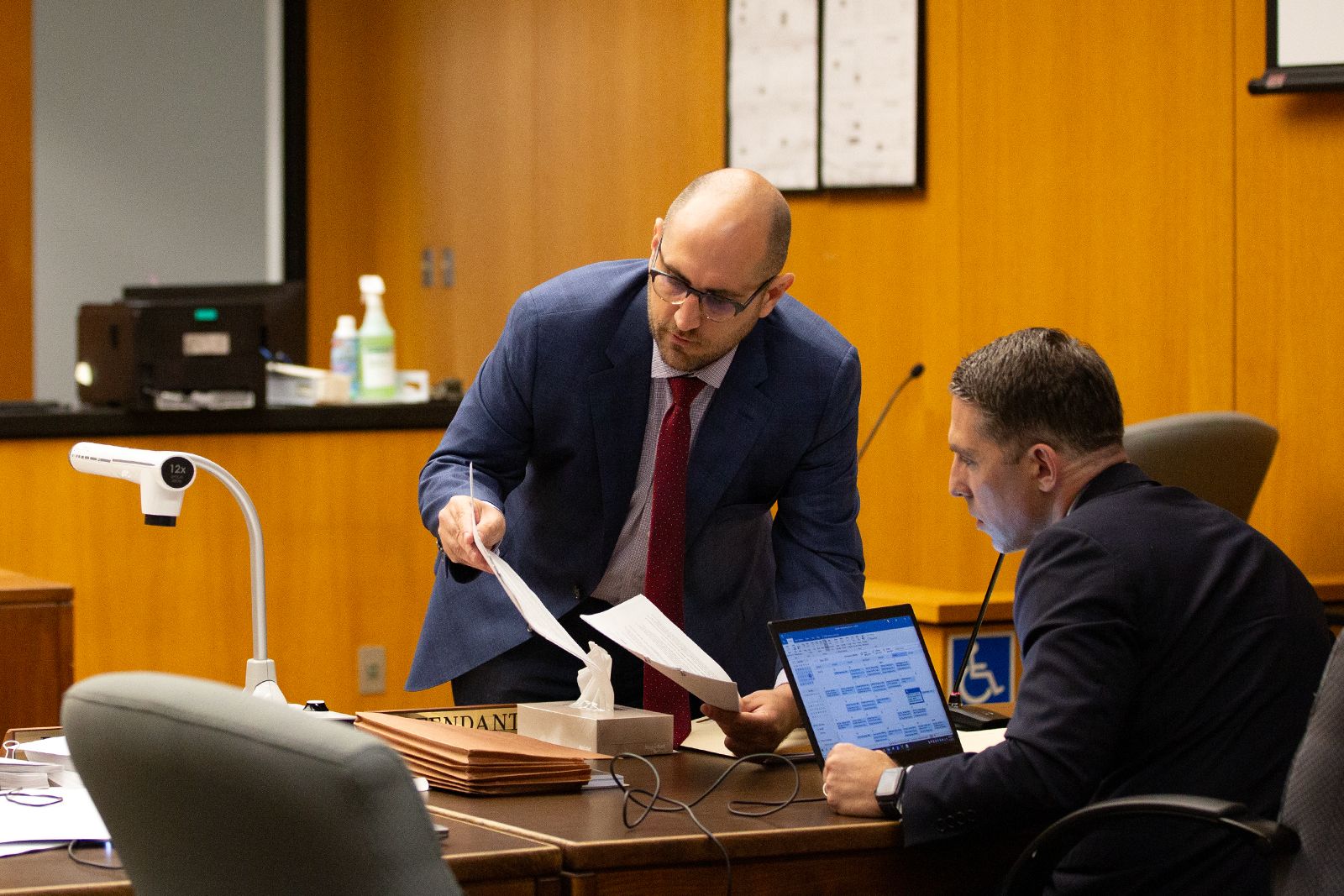
Weber's next statement to authorities came in April of this year when she spoke twice to Andrew Koltuniak, a longtime criminal defense investigator who was later hired by Chesa Boudin in the San Francisco district attorney's office before being tapped by DA Pamela Price to come to Alameda County when she took office.
In Alameda County, Koltuniak had been asked to review cases with alleged police misconduct violations and Brady violations, which relate to the disclosure of evidence.
Weber told Koltuniak she was concerned about being labeled a "snitch" and that "she had been running for her life since this case."
She told him Tran asked her to "do him a favor" in 2013 by saying she had seen the murder, and that she was to come into OPD to make a statement following a TV news broadcast about the case.
Weber told Koltuniak, and also testified, that Tran prepped her with details about the case right before she gave her recorded statement in 2013. He showed her photographs of two people and asked her to identify them, she said.
(She never mentioned any so-called "prep session" to Dalton when she told him about the case in years past, according to court testimony. She said that was because he didn't ask and because she didn't fully trust him.)
Weber testified definitively that Tran did not offer to pay her at the time of her initial statement to say she was a witness.
But she said she had gone down to OPD because he "told me he had a couple hundred dollars for me."
Tran, she said, told her "he had the right people but he didn’t have enough evidence."
She said he showed her photos of two men that she should pick out and identify, and then "he turned the camera on."
Weber testified that she had been able to provide so many details during the recording because Tran had just prepped her and shown her "pictures of the actual crime scene."
Weber said she told Tran she had not seen the murder and did not know the men in the photos. She said he told her not to worry because he would tell her what she needed to know.
That was in stark contrast to her original recorded statement, where she described at length "frequently" seeing "Gio" and "Corn" outside the barber shop near 45th and Market streets from her vantage point riding the 88 bus. At one point she lived in the area.
"Anybody that sell drugs know everybody that sell drugs," she said in 2013. "Everybody is familiar with each other."
Weber also offered conflicting information, even this past week, about where she was when the murder happened.
On Friday, she testified that she had told Tran she was at Apgar Street and West, about eight blocks south of 46th and West, when the murder happened.
But, also on Friday, she marked 46th and West on a map and said she had been standing there when she heard a boom and saw smoke during the murder.
"Is the X you put where you were told the murder occurred?" Linowitz asked her.
"No," she said Friday.
"So what is the significance of the X?" he asked her.
"That was the point from where I could see the smoke," she said.
During the trial, Weber was the only person who described having seen the shooting. But other evidence in the case corroborated aspects of her testimony, including a witness who described Butler getting into a dispute over parking with Douglas and Hunter minutes before the fatal shooting.
Perjury charges stem from relationship with Weber, payments
Weber and Tran originally met in June 2011 after Weber was shot. The timing of their meeting became an issue after the trial and resulted, in part, in the perjury charges Tran now faces.
On the stand during the trial in 2016, defense attorney Paul Feuerwerker asked Tran if his first contact with Weber had been in September 2013.
Tran asked, in response, "When she came down to my department?"
Feuerwerker answered, "Yes," to which Tran replied, "Yes, sir."
Tran has said he was focused on answering questions about the investigation, which is why he did not bring up earlier contact with Weber.
At some point after the shooting, he and Weber began texting about neighborhood issues. (Accounts differ as to how their communication began.)
"Weber did not want to be a CI [confidential informant]," Tran wrote last year, "but she was interested in passing on information about dangerous people."
And Tran would sometimes send Weber information, too, according to court testimony. That included — once — a photograph of a 17-year-old alleged to have killed Weber's cousin.
On Friday, Feuerwerker testified that the defense was never informed about a pre-existing relationship between Tran and Weber. He said Weber had been presented in court as a good Samaritan who came forward "out of the blue" of her own volition.
Tran was also asked, during the preliminary hearing in 2014, if Weber asked for any type of reward money "or anything like that" on the day she made her initial statement.
And he was asked whether OPD or another law enforcement agency "provided her with any type of reward or anything of that nature."
Tran said no on both accounts.
Ganz, Tran's attorney, drilled down into how Tran may have understood the questions and the type of payments they related to when he testified in court.
Tran also faces bribery, attempted bribery charges
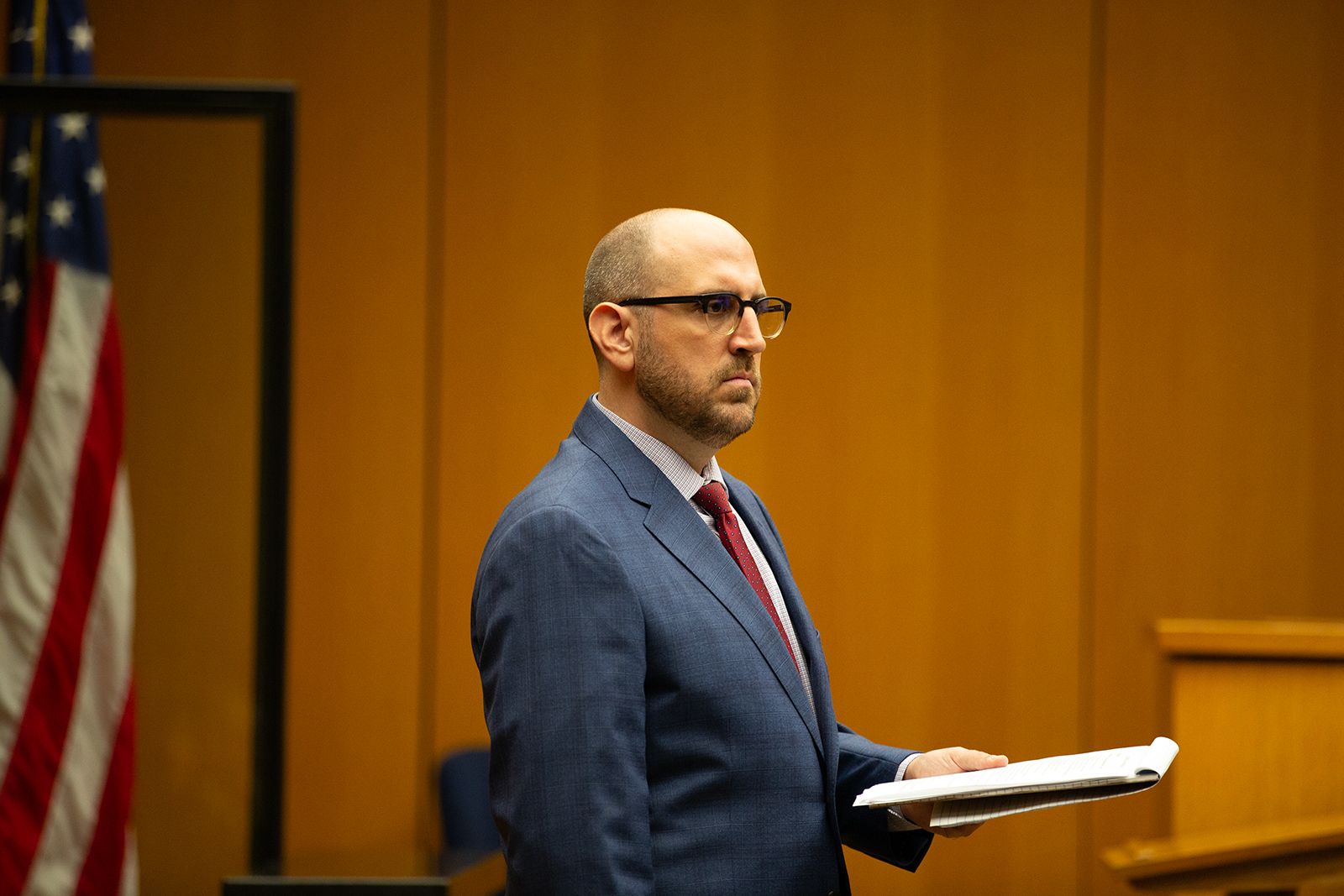
Tran has been charged with the bribery of Aisha Weber and the attempted bribery of Theresa Anderson Downs, another witness in the Butler case.
She testified during the trial that a man had run in front of her car around the time of the murder not far from the shooting scene. She said she hadn't seen his face or been aware of the subsequent murder.
She said Tran later came to talk to her about the case and showed her some photographs.
She said she felt pressured to identify the man because of Tran's persistence. But she never changed her story.
On the stand Tuesday, she said Tran came to speak to her twice in 2012.
The second time, she said, he mentioned that her son was in custody on a robbery case and indicated he could "help" with that if she could identify the man who ran in front of her car.
"It made me feel really angry," she testified. "I told him, that’s another mother’s son, that I cannot send another mother’s son to jail over something I did not see."
In his declaration last year, Tran said he only interviewed Anderson Downs once.
There was a recording of one interview between them. It was not played in full in court Tuesday, but everyone agreed it was cordial and did not include references to Anderson Downs' son.
Inspector Koltuniak testified at length on Tuesday, including about how Tran's case file for Anderson Downs did include a printout of her son's arrest history.
Regarding Weber, Koltuniak said he reviewed Tran's chronological notes for the Butler murder and could find no record of a call from Weber to Tran in 2013 before she gave her initial statement. Such a note would have corroborated Tran's account.
Koltuniak said Tran did make a notation in his Butler case notes when an anonymous witness called in with a tip.
Koltuniak also testified that Weber had referenced at least two facts in her initial statement to OPD that had not been in the news report she said brought her in: that the victim was driving home when he was shot and that, at the time of the news report, his father was dying of cancer.
DA Price has been in the building — but not in court
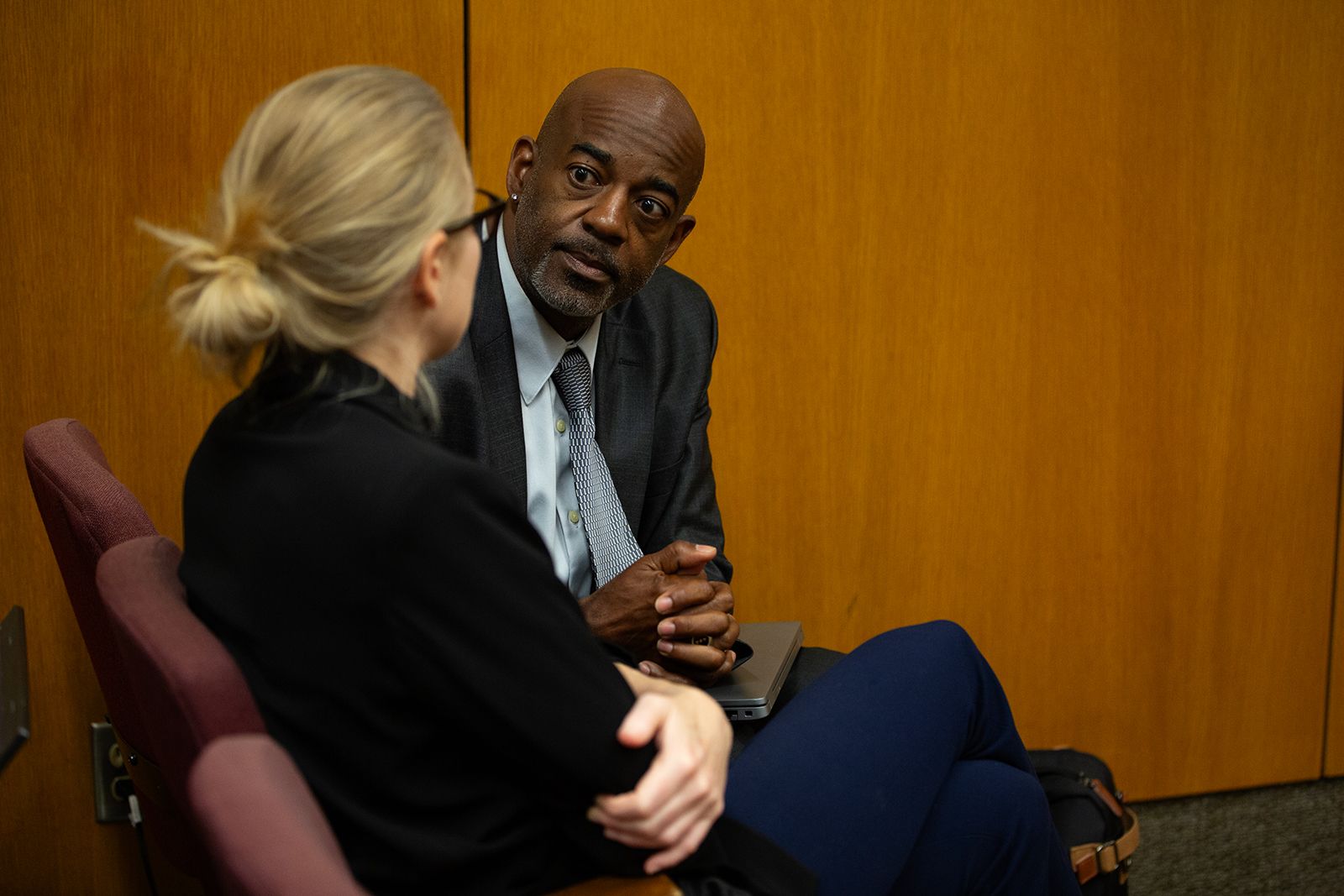
The Tran case is among several prosecutions DA Pamela Price has launched against law enforcement officers since taking office in January.
Price herself has not been in the courtroom for the Phong Tran case since the preliminary hearing began.
But she was reportedly in the building, at the Wiley W. Manuel Courthouse, on Friday morning.
Kwixuan Maloof, a member of Price's transition team who runs her Civil Rights Bureau, has attended the proceedings.
Maloof also oversees Price's Public Accountability Unit, a section of the bureau that is "tasked with holding law enforcement and public officials accountable for misconduct."
Maloof said Friday that he was not sure what sort of prison sentence Tran might face if he is one day convicted.
When Price announced criminal charges against Tran in April, she said her office would also review "at least 125 cases" he investigated. The Northern California Innocence Project signed on to help in that effort.
"When the integrity of a conviction is at issue in one case, it raises questions in every other case that officer has investigated," DA Price said in a prepared statement in April. "The people of Alameda County need to have confidence in the criminal justice system, and these charges are a step forward toward regaining that trust."
In a recent motion, Ganz argued that Price filed charges against Tran "without evidence of any crime" and then made "completely inaccurate public statements" about the facts of the case when she described it to the community.


